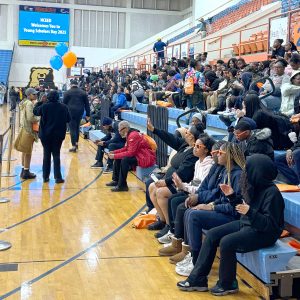By: Tory N. Parrish
Morgan’s Young Scholars Program Gives Children a Taste of Higher Education
They came. They saw. They might come back to conquer higher education several years from now, as first-year students at Morgan State University.
 “It was actually pretty fun, just looking at…how the community moves throughout the school and what they do,” says Izaiah Lessane-Rouzer, 11, one of the Gardenville Elementary School students who visited Morgan for the University’s second annual Young Scholars Day this year, on April 7. Izaiah, an aspiring astrophysicist interested in Morgan’s science programs, said he was impressed with the University’s large campus as well as Morgan’s reach.
“It was actually pretty fun, just looking at…how the community moves throughout the school and what they do,” says Izaiah Lessane-Rouzer, 11, one of the Gardenville Elementary School students who visited Morgan for the University’s second annual Young Scholars Day this year, on April 7. Izaiah, an aspiring astrophysicist interested in Morgan’s science programs, said he was impressed with the University’s large campus as well as Morgan’s reach.
The Gardenville contingent was one of many at this year’s Young Scholars Day, which drew more than 1,100 students from 27 elementary and middle schools in Maryland, Delaware, New Jersey, New York, Pennsylvania, Virginia and Washington, DC, to tour the campus. The program aims to expose children to college life and inspire them to prepare themselves academically and pursue higher education. Student turnout grew by 38% compared with the Young Scholars Day event last year, says the program’s founder, Walter Fields, who works with Morgan’s National Center for the Elimination of Educational Disparities, or NCEED. Morgan launched NCEED in 2022, under the purview of the University’s School of Education and Urban Studies (SEUS), with the mission of improving educational outcomes for Black, Latino and economically disadvantaged students in Maryland and nationwide.
“I think we stumbled onto something here, that for a long time, our college conversation was really about high school students. And I think we’re beginning to learn that we need to have this dialogue as early as second and third grade,” Fields says.
NCEED hosts Young Scholars tours of Morgan throughout the year, engaging chaperoned students in kindergarten through eighth grade in age-appropriate discussions with University students and faculty. The talks are focused on admissions requirements and getting prepared for college. Young Scholars Day, held each year in April, is a more elaborate program.
Planting Seeds
Tristan Odige, 13, was a sixth-grader when he and other students from South Orange Middle School in New Jersey toured Morgan on Young Scholars Day in April 2024. During the visit, he enjoyed learning about Morgan students’ history of civil rights activism, says Tristan, adding that he was impressed with the campus culture.
“It was very fun.… I never really got to see (an historically Black university before),” says Tristan, an aspiring professional soccer player who wants to attend Morgan.
This year, Izaiah Lessane-Rouzer was one of about 50 fourth- and fifth-graders who journeyed from Gardenville Elementary to Morgan for the program. The students enjoyed the interactive event, which can become an integral part of a foundation for academic success for the youngsters, says Harvey Miles, community school coordinator at the public school in Baltimore City.
“…We just want to begin to plant seeds in our students with education. We want them to begin to start thinking about what they want to do in life…to encourage them and to inform them that they have everything that they need to be successful,” Miles says.
About 2,300 children participated in Young Scholars tours at Morgan throughout the 2023–2024 academic year, and about 2,600 took part in the tours in 2024–2025.
A Partnership Pillar
Fields conceived Young Scholars as part of NCEED’s Family, Student and Teacher Academic Resilience (fSTAR) “pillar,” which supports partnerships between schools and families, and networking with community-based organizations to improve students’ academic performance. Fields is the community engagement and public policy liaison for fSTAR, which works in conjunction with the Center’s other pillars, such as dismantling barriers to literacy and preparing teachers to alter the trajectories of students of color, with the goal of eliminating educational disparities.
Fields’ work with Young Scholars and other NCEED programs provides critical advising services to students to help them understand what they need to succeed in college, says Meria Carstarphen, Ed.D., director of NCEED.
“Coaching you, showing you the ropes, taking you to college campus, telling you how to do financial aid applications, helping you with your essays and getting things on time, understanding what coursework you’d be taking in high school to be competitive” are among the services provided, Dr. Carstarphen says.
Young Scholars grew out of Fields’ work as the founder of a nonprofit organization, Black Parents Workshop, a parents advocacy group in South Orange-Maplewood, New Jersey.
“The joy that I get is that…in the children that visit Morgan, I see my daughter,” Fields says. “…I can remember what she was like as a second-grader. And I can remember all the obstacles she faced as a student, so many obstacles that I had to create a not-for-profit organization to file a lawsuit on behalf of her and (other) Black students in our New Jersey school district.”
The Black Parents Workshop reached a settlement with the South Orange-Maplewood School District in 2020 over alleged discrimination against Black students.
Young Scholars “for me, is a way of continuing to do my part (to uplift) the next generation,” says Fields, who earned a bachelor’s degree in Political Science from Morgan in 1982 and is a current doctoral student in Applied Sociology and Social Justice at the University. “…And it feels great to be able to do this work at some place that’s so special to me.”
Spreading the Word
Young Scholars is open to students of all races, ethnicities and economic circumstances and is growing in recognition through word-of-mouth discussions among educators and parents, Fields says. He reports that about 2,300 children participated in Young Scholars tours throughout the 2023–2024 academic year, and about 2,600 took part in the tours in 2024–2025. Those numbers include participants in Young Scholars Day, which this year featured an academic pep rally with a DJ and a performance by Morgan’s Magnificent Marching Machine marching band, at Hill Field House. Also on the agenda were student tours of residence and lecture halls, including demonstrations of technology used in classrooms, and a mini college fair, where youngsters visited tables to meet with university admissions staff to discuss the requirements to attend those institutions.
“They have lunch on campus. They get to see college students in action,” Fields says. “And it’s just a way of exposing children who most likely have never stepped on a college campus.”
Fields emphasizes that Young Scholars does not encourage the children to choose to attend Morgan over other universities.
“We don’t push Morgan on the kids. We push college on the kids. And we push careers on the kids,” he says. “And we just try to make them understand that what they see they can be part of.”
Participation in Young Scholars is free for students and schools, except for the cost of lunch in a University dining hall during the regular campus tours held throughout the year, Fields reports. Morgan provides box lunches to children cost-free on Young Scholars Day.
After children participate in Young Scholars tours at Morgan, Fields returns the favor by visiting their schools on career days, “Because we’re trying to build relationships with these schools so (they) know we are a resource to them,” Fields said.
About NCEED
Morgan’s National Center for the Elimination of Educational Disparities (NCEED) has played a pivotal role in fostering educational opportunities and literacy in Baltimore. The Center’s events, such as the “Young Scholars Day” and “Battle of the Books,” a celebration of reading and literacy, have brought hundreds of students from across Baltimore and neighboring regions to Morgan’s campus, exposing them to higher education environments. In addition, the Center’s partnerships with local schools, and organizations such as the Greater Baltimore Urban League, have provided vital support for students and early-career teachers, reinforcing the city’s educational infrastructure.
At the state level, NCEED’s collaborations with Harford and Baltimore County Public Schools through the “Grow Your Own” program underscore its commitment to developing a diverse and skilled educational workforce. These initiatives, along with the Center’s involvement in the statewide Assessment and Accountability Task Force, highlight NCEED’s dedication to shaping the future of education in Maryland by addressing teacher shortages and promoting high standards in student assessments.
…For a long time, our college conversation was really about high school students. And I think we’re beginning to learn that we need to have this dialogue as early as second and third grade.
We don’t push Morgan on the kids. We push college on the kids. And we push careers on the kids. And we just try to make them understand that what they see they can be part of.










